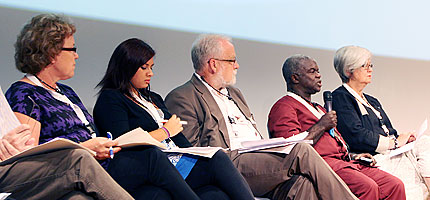Liberia has accumulated a USD 4.6 billion debt under dictatorships since 1846, according to Bishop Sumoward Harris of the Lutheran Church in Liberia. Harris was among a group of panelists discussing the problem of illegitimate debt at the Eleventh Assembly public hearing. Lutheran churches in Latin America initiated study on the issue on behalf of the wider communion. © LWF/J. Latva-Hakuni
25.07.2010
“Profits Only” Thinking Deprives People of Daily Bread
Lutherans ponder illegitimate foreign debt as a justice issue
STUTTGART, Germany, 25 July 2010 – Some financial institutions consider only profits instead of also taking people’s needs into account, “which causes many people to be deprived of their daily bread,” Bishop Ángel Furlan of the Evangelical Lutheran Church in Argentina told delegates at the Eleventh Assembly of the Lutheran World Federation (LWF), 24 July. Debt plays a fundamental part in excluding people from food, education and health services in countries where accumulated debt has become an overwhelming burden, he said.
Presenters during the public hearing on illegitimate debt reported that over the years developing countries accumulated debt to international creditors, often in times of dictatorships or when financial organizations considered only profits. For over three decades this external debt servicing has forced millions of people into poverty by reducing their access to food and opportunity.
For example, “when we ask for our daily bread in Latin America,” there is always an element of external debt, said Rev Dr. Gloria Rojas Vargas, President of the Evangelical Lutheran Church in Chile. Hunger, social justice and lack of opportunity are all related to debt, which affects young and old, women and men, and every level of society.
Liberia has accumulated a USD 4.6 billion debt under dictatorships since 1846, said Bishop Sumoward Harris of the Lutheran Church in Liberia. “How can such a poor country possibly pay for this when the people have so little money, and many have no food, no education?”
An example of illegitimate debt was provided by Bishop Sumoward Harris of the Lutheran Church in Liberia and Ms Margareta Grape of the Church of Sweden. Up until 1980 the government of Liberia had bought warships worth USD 6.4 million from Sweden, plus USD 1.8 million in interest, creating a great burden of ongoing debt for Liberia. In 2008 the churches from the two countries demanded that the Swedish government accept shared responsibility, declare the Liberian debt to be illegitimate, and cancel the debt.
This initiative was partly successful. The Swedish government cancelled the debt but it did not accept shared responsibility. Instead the amount of the debt cancellation was subtracted from Sweden’s development aid budget.
In another case, the churches in Costa Rica and Finland documented the providing of credit that was connected with corruption, Ms Cristina Mora of the Lutheran Costa Rican Church and Ms Tuula Siljanen of the Evangelical Lutheran Church in Finland, explained. Using so-called “export credit”, the Finnish government enabled the sale of machines to Costa Rican hospitals, but only if they were purchased from a particular Finnish company. Furthermore, the operation of the machines was complicated and they could not be used by the Costa Rican hospitals.
The churches supported changing the understanding of debt from a very narrow legal interpretation to a more comprehensive, moral and ethical one, explained Siljanen. In this process the churches are demanding more transparency in government and in the practices of business enterprises.
“A new financial architecture” – one that cares for people and safeguards creation
Lutherans must provide an in communio response to debt relief and responsible lending, said Mr Peter Prove, Executive Director of the Ecumenical Advocacy Alliance.
The church has a long experience with diakonia to alleviate poverty and now also must move towards “prophetic diakonia,” said Jürgen Kaiser of Erlassjahr (a coalition of 700 churches and non-governmental organizations working on illegitimate debt) in Germany. “We need to look for a new financial architecture”—one that includes taking care of people and safeguarding creation. Ethically speaking, debts should be paid, but fraud and extortion need not be a part of debt.
“Trillions of accumulated debts have become an overwhelming burden for many countries, including northern countries,” said Kaiser. “Institutions don’t want to discuss loans to dictatorships; or those transformed into public debt, usury or corruption; or power inequities when debts are renegotiated.” They do not want to talk about rapacious lending practices or second-hand debt packaging.
These debts have left too many people behind, and the image of God in so many has been injured. “We in the church must talk about these things…. We must be actors, not spectators,” Kaiser said.
Rev Atle Sommerfeld of Norwegian Church Aid said, “We need to say that this is a simple ethical issue. If the person taking the loan is a crook, a dictator, and you have a vested interest in selling to them, you are responsible … We must have the courage to say that, even though, technically, it can be quite complicated.”
In a recorded message, Bishop Karl Sigurbjörnsson of The Evangelical Lutheran Church of Iceland said, “When works and achievements, profit and productivity are put first, the Lutheran doctrine of grace becomes very important. ‘Forgive us our debts.’ We are all indebted to one another. This is the context of community.”
The issue of illegitimate debt has been pursued actively for three decades through the LWF Illegitimate Debt Program. It has resulted in a publication Not Just Numbers: Examining the Legitimacy of Foreign Debts (Minneapolis, MN: Lutheran University Press, 2003). (822 words)
Public statement "Illegitimate Debt and the International Financial Crisis"
uploads/media/Consolidated_Report-Actions_Taken_by_Eleventh_Assembly_01.pdf

